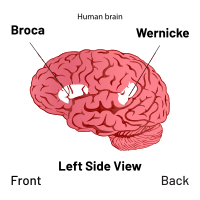- For a topical guide of this subject, see Outline of linguistics
Welcome to the Linguistics Portal!Linguistics is the scientific study of language. The areas of linguistic analysis are syntax (rules governing the structure of sentences), semantics (meaning), morphology (structure of words), phonetics (speech sounds and equivalent gestures in sign languages), phonology (the abstract sound system of a particular language), and pragmatics (how the context of use contributes to meaning). Subdisciplines such as biolinguistics (the study of the biological variables and evolution of language) and psycholinguistics (the study of psychological factors in human language) bridge many of these divisions. Linguistics encompasses many branches and subfields that span both theoretical and practical applications. Theoretical linguistics (including traditional descriptive linguistics) is concerned with understanding the universal and fundamental nature of language and developing a general theoretical framework for describing it. Applied linguistics seeks to utilize the scientific findings of the study of language for practical purposes, such as developing methods of improving language education and literacy. Linguistic features may be studied through a variety of perspectives: synchronically (by describing the structure of a language at a specific point in time) or diachronically (through the historical development of a language over a period of time), in monolinguals or in multilinguals, among children or among adults, in terms of how it is being learnt or how it was acquired, as abstract objects or as cognitive structures, through written texts or through oral elicitation, and finally through mechanical data collection or through practical fieldwork. Linguistics emerged from the field of philology, of which some branches are more qualitative and holistic in approach. Today, philology and linguistics are variably described as related fields, subdisciplines, or separate fields of language study but, by and large, linguistics can be seen as an umbrella term. Linguistics is also related to the philosophy of language, stylistics, rhetoric, semiotics, lexicography, and translation. (Full article...) Selected article -Truthiness is a quality characterizing a "truth" that a person making an argument or assertion claims to know intuitively "from the gut" or because it "feels right" without regard to evidence, logic, intellectual examination, or facts. American television comedian Stephen Colbert coined the word in this meaning as the subject of a segment called "The Wørd" during the pilot episode of his political satire program The Colbert Report on October 17, 2005. By using this as part of his routine, Colbert satirized the misuse of appeal to emotion and "gut feeling" as a rhetorical device in contemporaneous socio-political discourse. He particularly applied it to U.S. President George W. Bush's nomination of Harriet Miers to the Supreme Court and the decision to invade Iraq in 2003. Colbert later ascribed truthiness to other institutions and organizations, including Wikipedia. Colbert has sometimes used a Dog Latin version of the term, "Veritasiness". Truthiness, although a "stunt word", was named Word of the Year for 2005 by the American Dialect Society and for 2006 by Merriam-Webster. Linguist and OED consultant Benjamin Zimmer pointed out that the word truthiness already had a history in literature and appears in the Oxford English Dictionary (OED), as a derivation of truthy, and The Century Dictionary, both of which indicate it as rare or dialectal, and to be defined more straightforwardly as "truthfulness, faithfulness". Responding to claims, Colbert explained the origin of his word as: "Truthiness is a word I pulled right out of my keister". Did you know...From Wikipedia's "Did You Know" archives: 
Related PortalsThings you can do
WikiProjectsThe following WikiProjects work to improve topics concerned with linguistics:
Associated WikimediaThe following Wikimedia Foundation sister projects provide more on this subject:
Discover Wikipedia using portals |


























